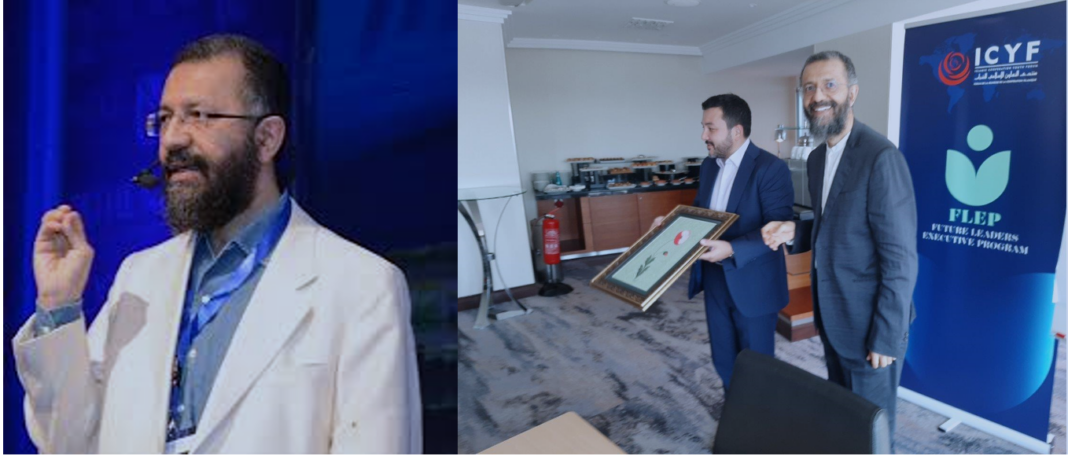In the epic city on two legs, each on other continent – Istanbul, the Future Leaders Executive Program (FLEP) welcomed four guests for its two full days June 2023 session. A definite highlight of the June round was a visit and the lecture of the Karachi-based Islamic Chamber of Commerce, Industry and Agriculture (ICCIA) Secretary General, Dr. Yousef Khalawi. With a deep understanding of the interconnectedness of economy, religious philosophy and ethics, businesses and politics, Dr. Khalawi shared his invaluable insights on the current state of global economic affairs, challenges, obstacles and ways to tackle those.
Saudi-born Dr. Yousef Khalawi graduated from the Imam Mohammed Bin Saud Islamic University (Faculty of Theology), with further specialisations in comparative fiqh, international investment, arbitration and dispute resolution. He obtained his subsequent legal education in various international law and consultancy firms in Germany (Frankfurt), Switzerland (Geneva) and UK (London). He has established many companies with a large number of investors in more than 70 countries around the world, has served as a board member, and chairman of audit and management committees in various companies.
Besides being the ICCIA Sec-General for the past 5 years, Dr. Khalawi is also a board member of many important companies around the world and a member of the Board of Trustees in various international organizations, including the Accounting and Auditing Organization for Islamic Financial Institutions in Bahrain (AAOIFI), and the Islamic Fiqh Academy’s Main Committee member. Conclusively, he is a board member of the Saudi Commercial Arbitration Center in Riyadh – SCCA, which is the highest Saudi arbitration authority.
Energetically thinking alternatives to the existing system
Secretary-General opened his talked by sketching the current state of global economy and finances, describing it as highly worrying and definitely unsustainable on a long run. This state of affairs invites all of us to energetically think alternatives and fundamental adjustments to the existing system which already spent his model, on both levels – trust and operability. Since every crisis is at the same time opening to new opportunities; this might be a way to consider the Islamic financing mechanisms, but even more the concept of Islamic economy as whole. Such approach would globally relax brewing tensions and omnipresent recession of trust.
In the context of a crucial importance of Islamic finance, Secretary General Dr. Yousef Khalawi referred to “Sukuk” as a more flexible funding mechanism compared to usual financial instrument of bonds. This because it has funding mechanisms that are not existed with classical bonds, which makes “Sukuk” object of close consideration of governments, even the non-Muslim ones (like numerous in Latin America and Asia).
Developing verity of mechanisms of microfinance
In this regard, drawing from his profoundly rich professional and personal life journey, The Secretary-General highlighted the dire need to microfinance, particularly in the developing countries. In the light of ICCIA’s efforts to develop verity of mechanisms of microfinance and promote its position globally, Secretary-General Khalawi also pointed out that the Islamic economy’s firm scientific merits which survived tests of history and numerous regional realities throughout calamitous centuries – which only means one: That system is beyond any narrow religious interpretation, and is as such applicable for those confessing any religion and those non-religious as well.
The tantalising sparkling and inspiring tit-for-tat exchange between Secretary-General, and the FLEP participants draw to its close with open exchanges, brain-storming. To say; in a search, and a quest for solutions, to live future of a safer and fairer world – emphatic moral and inclusive, while striving to the realisation of human race.
Dr. Yousef Khalawi’s participation in the Future Leaders Executive Program provided an indispensable opportunity for emerging leaders to gain insights into the current state of the global economic and financial affairs and their subtle interplay with geopolitics, security and civilisation advancements. His huge experiences and wisdom shed light on the essential values and principles that can guide aspiring leaders on their path to success, ensuring a more inclusive, compassionate, secure and just future.
Summing up that special day with the ICYF President, Mr. Taha Ayhan (who acted as a principal host to the event), Secretary-General Khalawi jointly expressed what all participants had already concluded throughout the day: that the Future Leaders Executive Program (FLEP) offers a unique setting and the winning narrative. Excellency Khalawi and President Taha both agreed that such a particular format – by which an established experience meets the new passions, drives, rhythms and colours through cross generational leaders’ talks – represents a once-in-a-lifetime opportunity for emerging leaders from verities of environments: the state, intergovernmental, and corporate sectors of all meridians.
Secretary-General expressed his joy that the FLEP’s mesmerising ship of insights and wisdom gets a full swing sail once again in the Fall this year.
About the author:
Isabella Maria Bello Arocha – Madrid-based researcher specialized in comparative law and international relations. She covers International Institute IFIMES before the UNWTO, other Iberia-based and Latin American international FORAs.




